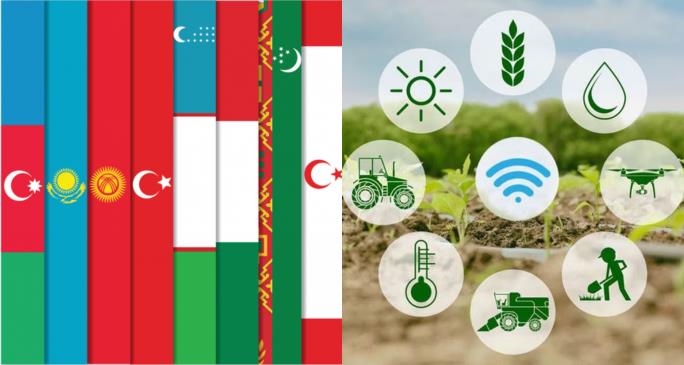
Turkic States Seek Policy Harmonization To Boost Agribusiness
In an era marked by unprecedented global challenges, ranging from climate change and food insecurity to shifting economic landscapes, the need for regional cooperation has never been more urgent. For the member states of the Organization of Turkic States (OTS), which share not only linguistic and cultural ties but also similar economic structures and environmental challenges, deepening collaboration offers a strategic avenue to bolster agricultural productivity, enhance food security, and drive sustainable development across the Turkic world.
The IV Turkic States Agribusiness Forum, held recently in Cholpon-Ata, Kyrgyz Republic, marked a significant step forward in fostering agricultural collaboration within the Organization of Turkic States (OTS). Conducted alongside the IV Meeting of Agriculture Ministers of OTS, the forum convened government officials, industry experts, and agribusiness representatives from member and observer countries, reflecting a shared commitment to elevating the agrarian sector as a driver of economic development and regional integration.
Opening the forum, Kyrgyz Deputy Prime Minister and Minister of Water Resources, Agriculture, and Processing Industry Bakyt Torobaev highlighted the multifaceted role agriculture plays in the OTS region, spanning food security, environmental stewardship, and climate resilience. His remarks underscore a growing recognition that addressing systemic challenges such as water scarcity, land degradation, and biodiversity loss requires coordinated action. This holistic approach aligns with global trends emphasizing sustainable agricultural development as a linchpin of national security and economic stability.
Notably, Torobaev's call to expand trade turnover within the agricultural sector among OTS countries signals an ambition to move beyond isolated national efforts toward creating integrated supply chains. This regional cooperation could reduce dependency on external markets, stabilize food supplies, and foster shared prosperity.
Azerbaijan's Minister of Agriculture, Majnun Mammadov, provided a compelling case study of how policy innovation and infrastructure development can transform the agricultural landscape. The exemption of the agricultural sector from nearly all taxes (except land tax), combined with substantial state support through subsidies and concessional loans, creates an enabling environment for farmers and agribusinesses. This financial scaffolding is essential in mitigating risks inherent in agriculture, especially in volatile climatic and economic contexts.
Moreover, Azerbaijan's emergence as a Eurasian transit and logistics hub, driven by large-scale transnational transport projects, exemplifies the strategic advantage of linking agriculture with infrastructure. Such connectivity not only facilitates the efficient export of agricultural goods but also integrates the region into broader global value chains. For OTS countries, replicating this model could enhance their competitiveness and open new markets for agricultural products.
Minister Mammadov's emphasis on public-private partnerships (PPPs) reflects a pragmatic understanding that sustainable agricultural development requires active collaboration between governments and the private sector. PPPs can mobilize investment, foster innovation, and ensure that agricultural growth translates into inclusive economic benefits.
Contributions from representatives such as Uzbekistan's Deputy Minister Kahramon Yuldashev, TDC Deputy Secretary General Merey Mukazhan, and Secretary General of the Union of Turkish Chambers of Commerce and Industry Adem Kula enriched the dialogue by highlighting the agricultural potential and challenges across member states. Their shared focus on forging new cooperative pathways and unlocking investment opportunities illustrates a collective commitment to harnessing the Turkic world's agricultural assets more effectively.
The forum's structure-with dedicated panel sessions on topics like trade facilitation, animal husbandry, genetic preservation, and water resource management-fostered targeted discussions on both traditional and emerging priorities. For instance, the emphasis on protecting rare animal breeds and advancing agricultural biotechnology demonstrates a forward-looking approach that values both heritage and innovation.
The spotlight on water management resonates deeply in a region where water scarcity threatens agricultural productivity and rural livelihoods. Effective use of water resources is not only critical for food security but also for maintaining regional stability, as water issues often transcend national borders.
Bilateral meetings held during the forum between agribusiness companies from member states signal a promising shift from dialogue to concrete cooperation. These interactions could catalyze joint ventures, technology transfers, and market access agreements that translate high-level commitments into tangible outcomes.
However, challenges remain. Diverse economic capacities, varying levels of technological development, and differences in regulatory environments can hinder seamless cooperation. Addressing these requires sustained political will, harmonization of standards, and capacity-building initiatives tailored to the unique contexts of each member state.
In conclusion, the IV Turkic States Agribusiness Forum reflects a maturing regional agenda that prioritizes agriculture not just as a sector, but as a strategic foundation for economic resilience and integration. The OTS's focus on sustainable agriculture, supported by policy innovation, infrastructure development, and public-private partnerships, sets a promising path forward. Success in this endeavor could serve as a model for other regional organizations seeking to leverage their agricultural potential for broader socio-economic development.
Legal Disclaimer:
MENAFN provides the
information “as is” without warranty of any kind. We do not accept
any responsibility or liability for the accuracy, content, images,
videos, licenses, completeness, legality, or reliability of the information
contained in this article. If you have any complaints or copyright
issues related to this article, kindly contact the provider above.















Comments
No comment